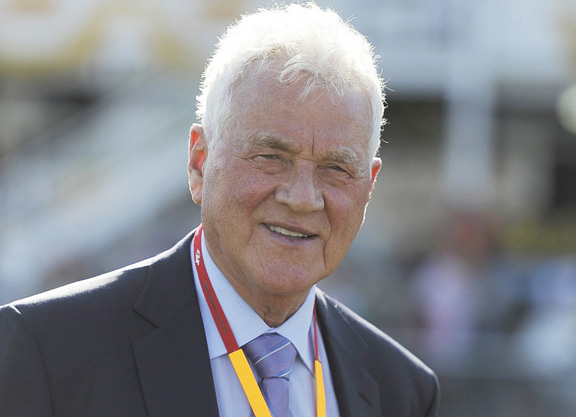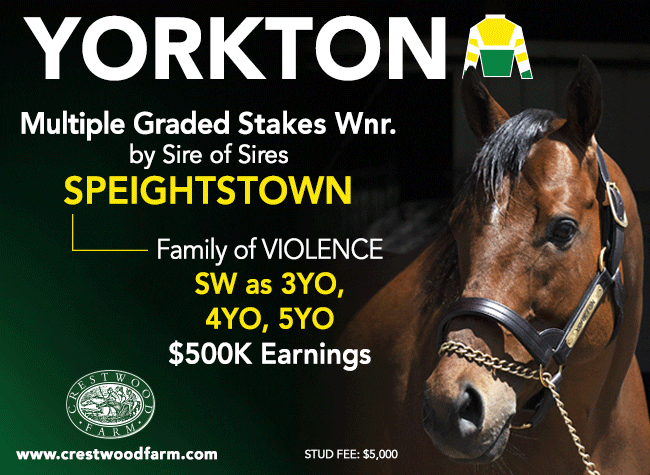By T. D. Thornton
Thursday's California Horse Racing Board (CHRB) meeting in Pleasanton was book-ended by the board's approval of a number of safety-related rules to tighten veterinary and medication practices, plus strident public commentary from anti-racing advocates who continue to call for the banishment of the sport in the wake of 29 horse deaths at Santa Anita Park.
In the middle of it all, Frank Stronach, the 86-year-old founder of The Stronach Group (TSG), led off the public commentary session by testifying that he is in full control of the family empire whose nationwide six-track portfolio includes Santa Anita.
Frank Stronach alluded obliquely to the $500-million lawsuit he initiated against his daughter, Belinda Stronach, over who truly controls TSG, and repeated assertions he has recently made about Santa Anita's property needing to be put in a trust to shield it from future development. Without mentioning specifics, Stronach contended that a move to a trust ownership would be a crucial step toward improving equine safety at the track.
“I did not buy those racetracks [so] that they could be sold. You see, horse racing is more than the business,” Stronach said. “Horse racing really should be run by a trust, okay? We would like to discuss that, okay? I want to prevent that the tracks [will be] used for development, right? Yes, we can build hotels to improve, yes, as long as it enhances horse racing. But not to the detriment that we shut the tracks.
“So that's one of our commitments,” Stronach continued. “But at the same time, if we come up with a new structure…we must attach a horse racing charter of rights to the structure. And we have to prove to the public that horsemen do care for the horses.”
Like a number of the 18 members of the public who signed up for their three minutes at the microphone, Stronach had difficulty articulating his thoughts within that time limit, which was more stringently enforced by the CHRB than it has been at previous meetings.
Stronach repeatedly emphasized that he wanted to work with stakeholders, animal rights activists, and CHRB members, admitting that “we still have a long ways to go” to bring about meaningful reforms. He suggested that 1% of betting handle could be used to fund the retirement needs of racehorses.
But CHRB vice chair Madeline Auerbach pressed him for more granular details, asking, “What would you do to help the horses? What would you do that we haven't addressed?”
Stronach began his reply by stating that there are two reasons racehorses suffer injuries, overmedication and unsound racetrack foundations. Then, seemingly frustrated, he pivoted back to his family's very public spat.
“I've been shut out of TSG, even though I paid for everything,” Stronach vented. “I'm the founder. I've been shut out.”
Auerbach again asked Stronach to refocus on specifics related to helping horses.
“Well to help horses, the one thing you've got to prevent is that they break down, okay?” Stronach said. “There's a number of other things that we could do. Horses are entitled to…at least nine weeks on the farm without [being] locked up in a stall. Those will be all parts of a horse racing charter where we really address the concern.”
CHRB chairman Chuck Winner then asked if Stronach was speaking on behalf of TSG or himself.
“I represent the actual owners of TSG. I'm the founder, and have a family,” Stronach said, mentioning the support he has from his wife Elfriede, and his son, Andrew.
“But is Belinda not the chairman and president?” of TSG, Winner pressed.
“Yes, but I don't want to go into that,” Stronach said. “It's sad enough [to be involved in a lawsuit with one's daughter]. I present a proposal–ideas–by the rightful owners. And the court will decide who the rightful owners [of TSG] are. I am speaking as the rightful owner, with the endorsement of my wife and my son.”
Andrew Stronach later spoke during the public commentary period. He did not mention TSG or family affairs, and instead limited his comments to his concerns as a breeder about the overmedication of Thoroughbreds.
Of the other public speakers who articulated concerns related to the equine welfare crisis at Santa Anita, anti-racing advocates outnumbered pro-racing supporters by a 13-1 margin. Commentary by several other speakers cited both pros and cons, and fell somewhere in the middle on this polarizing issue.
Earlier, in a series of unanimous 4-0 votes, the CHRB withdrew its membership from the Association of Racetrack Commissioners International, and agreed to requests from Golden Gate Fields and the Ferndale and Sonoma County fairs that include allowing racing secretaries to establish conditions that will lower the allowable maximum race-day dosage of the Lasix from 500 mg to 250 mg during their upcoming race meets. Those latter approvals match both lower Lasix dosages and longer corticosteroid stand-down times established at other state tracks earlier this year.
Two separate rule proposals related to restrictions on shockwave therapy and a requirement for veterinary records for ship-in horses unanimously got advanced to 45-day public commentary periods. Both will need to come up again at a subsequent meeting in order to be fully adopted.
Not a subscriber? Click here to sign up for the daily PDF or alerts.






